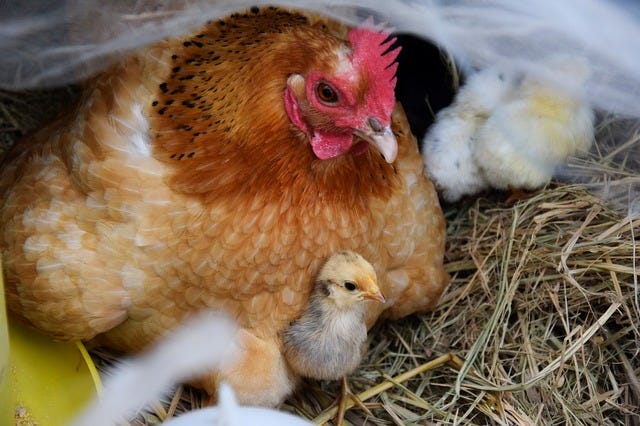Made in God's Image: Moral Bankruptcy and Mother Hens

Moral Bankruptcy and Mother Hens
This January I’m exploring some of the female metaphors for God in bible. Check out my introductory post, When you need better ways to talk about God.

You might have noticed there’s been a lot in the news about women lately.
There’s the #metoo movement where women have been speaking out about sexual harassment in just about every sphere of life, including that speech, from Oprah.
There’s the issue of gender pay equality, with organisations like the BBC getting in trouble for paying women less for doing the same job as men.
There’s the horrible way that women like historian, Mary Beard, or Channel 4’s Cathy Newman, get treated on Twitter for daring to be female and hold an opinion or do their job
Then there’s all the issues concerning women that don’t get raised in the media so often, like maternal mortality rates in the developing world, sex trafficking or mass rape as a weapon of war.
Patriarchy is alive and well and still ruining the lives of women in the 21st century.
But what can the church do about it? After all, it hasn’t treated women so well itself, on some occasions.
If the church is serious about valuing women, one simple thing it can do is to change its language about God.
As I argued last week, when we speak about God mainly in male terms, we tend to view God as male. And when we view God as male, we subconsciously begin to assume that to be male is to be more like God. So men are seen as more valuable, more worthy of being in charge, and the world is arranged to suit their needs. Women and their concerns are disregarded and marginalised.
However, both the bible and church tradition teach that God is neither male nor female and that both men and women are created in God’s image. Perhaps if the church spoke more frequently about God using female pronouns and metaphors, it would help counter the balance and remind the community that women and men are equal and equally valued by God.
There are plenty of feminine metaphors in the Bible to choose from and Jesus certainly wasn’t afraid of referring to himself in female terms:
Oh Jerusalem, Jerusalem, the city that kills the prophets and stones those who are sent to it! How often would I have gathered your children together as a hen gathers her brood under her wings, and you would not! (Matthew 23:37)
I love that Jesus describes himself as a mother hen!
It’s even more incredible when you consider the context.
In this verse, Jesus is addressing the Pharisees, who were the religious ‘gatekeepers’ of their day. They decided who was in and who was out, which behaviour was acceptable and which wasn’t. Then Jesus comes along and turns their world upside down, proclaiming himself as the new gatekeeper. What’s more he let all those traditionally considered to be sinners, in. He was scandalous, subversive and a great danger to the rigid moral authority of the Pharisees.
So all the way through Matthew’s gospel, they challenge Jesus, and try to trip him up with questions about his identity in order to catch him out and shut him down.
By this point in the Gospel, Jesus has finally had enough and severely rebukes them for their behaviour. They’ve been hypocritical and blind, failing to practice what they preach (v.3). They have focused on looking good on the outside, but are greedy and self-indulgent on the inside (v. 25). They ‘shut the kingdom of heaven in people’s faces’ (v.13) and enforce the following of the tiniest rules, while neglecting ‘the weightier matters of the law: justice and mercy and faithfulness’ (v. 23). They’ve not only refused to listen to God’s messengers, but have persecuted and killed them, and Jesus even wonders how these ‘serpents’ will escape being sentenced to hell (v. 33).
Jesus wraps up his fire and fury speech by telling the Pharisees, who have failed him so badly, exactly what he would like to do with them.
You might be forgiven for thinking he’s going to describe himself as a warrior about to conquer his enemies; or a bolt of lightning sent from God as judgement; or even a farmer pulling up weeds to throw on the fire.
Instead, Jesus chooses the metaphor of a mother hen, evoking a picture of closeness, comfort, safety and shelter, lamenting over the children who refuse to come under her care. He chooses humility, gentleness and fierce mother-love, even in the midst of his rightly placed anger.
The idea of God as a female bird offering her protection is repeated throughout scripture (e.g. Deut. Ps. 17:8, 36:7, 57:1, 91:1, Is. 31:5).
It’s also found in the book of Ruth:
…a full reward be given you [Ruth] by the Lord, the God of Israel, under whose wings you have come to take refuge (2:12).
Ruth, the widowed refugee, finds her refuge under the wings of God, whom she comes to know as a protective mother. And perhaps it is her close relationship with her Mother-in-law, Naomi, which has enabled Ruth to relate to God in this way.
When we keep female images for God at the forefront of our minds and mouths, we create communities that more fully represent the God in whose image we have all been created. We remember that loving our neighbour as ourselves means treating each other with respect, dignity and value because ‘there is neither male nor female’ in God’s eyes. We are all his beloved children, equally valuable and equally in need of his help and care.
If you know someone who would enjoy this email, please feel free to share it!


